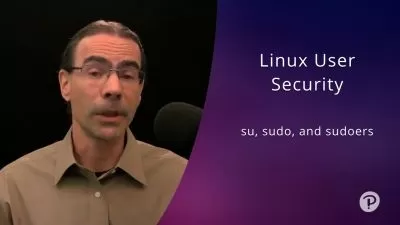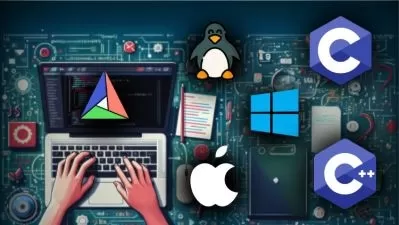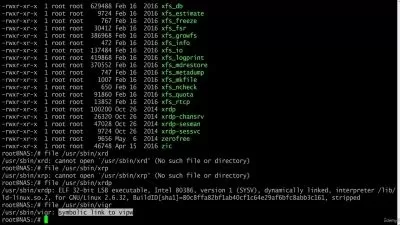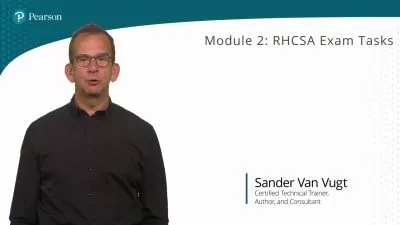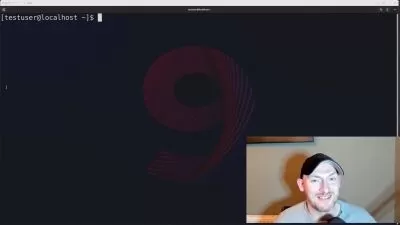Master Red Hat Containers: EX188 Certification Prep Pro
Focused View
4:26:37
1.1 What are Containers.mp4
01:14
1.2 Running Applications on an Operating System.mp4
01:50
1.3 Running Applications as Containers.mp4
01:22
1.4 Containers versus Virtual Machines.mp4
03:28
1.5 Why Podman Beats Docker.mp4
04:32
1.6 Containers and the Linux Kernel.mp4
04:42
2.1 Registry Access.mp4
06:24
2.2 Running Containers.mp4
09:34
2.3 Rootless versus Root Containers.mp4
11:02
2.4 Managing Containers.mp4
11:19
2.5 Container Networking.mp4
01:28
2.6 Accessing Containers.mp4
03:01
2.7 Restricting Containers.mp4
05:44
3.1 Using Image Registries.mp4
04:02
3.2 Pulling Images.mp4
04:31
3.3 Managing Images.mp4
01:14
3.4 Creating Custom Images from Running Containers.mp4
02:21
3.5 Using Tags.mp4
02:14
4.1 Using Containerfile.mp4
07:18
4.2 Applying Best Practices to Create a Containerfile.mp4
06:45
4.3 Advanced Containerfile Options.mp4
10:28
4.4 Containerfile ARG and ENV.mp4
03:43
4.5 Managing Container User IDs.mp4
07:52
4.6 Hosting a Private Registry.mp4
05:51
5.1 Overlay Union Filesystems.mp4
03:07
5.2 Using Persistent Host Storage.mp4
06:33
5.3 Managing Permissions.mp4
09:12
5.4 Managing SELinux Settings.mp4
03:54
5.5 Configuring Storage for Stateful Applications.mp4
02:59
6.1 Container Logging.mp4
03:53
6.2 Connecting to Running Containers.mp4
04:54
6.3 Troubleshooting Network Issues.mp4
01:38
7.1 Systemd User Units.mp4
05:56
7.2 Generating Systemd User Units.mp4
04:08
7.3 Automatically Updating Systemd Managed Containers.mp4
03:13
8.1 Understanding Microservices.mp4
02:54
8.2 Using Compose to Run and Manage Microservices.mp4
07:52
9.1 Kubernetes and OpenShift.mp4
04:47
9.2 Taking an OpenShift Testdrive.mp4
07:56
10.1 Running a Container.mp4
06:08
10.2 Building a Custom Image.mp4
03:35
10.3 Running a Microservice.mp4
03:02
10.4 Analyzing Running Containers.mp4
05:25
10.5 Running a Local Registry.mp4
03:13
10.6 Creating a Custom Image from a Running Container.mp4
02:39
10.7 Managing Container Users and Permissions.mp4
05:27
Learning objectives.mp4
00:37
Learning objectives (1).mp4
00:36
Learning objectives (2).mp4
00:34
Learning objectives (3).mp4
00:46
Learning objectives (4).mp4
00:36
Learning objectives (5).mp4
00:30
Learning objectives (6).mp4
00:32
Learning objectives (7).mp4
00:27
Learning objectives (8).mp4
00:24
Learning objectives (9).mp4
00:40
Lesson 2 Lab Managing Containers.mp4
03:00
Lesson 3 Lab Managing Images.mp4
05:19
Lesson 4 Lab Creating Custom Container Images.mp4
04:30
Lesson 5 Lab Configuring Container Storage.mp4
05:01
Lesson 6 Lab Troubleshooting Containers.mp4
03:14
Lesson 7 Lab Starting Containers with Systemd.mp4
04:17
Lesson 8 Lab Using Compose.mp4
04:02
Lesson 9 Lab Running Applications in OpenShift.mp4
02:30
Red Hat Certified Specialist in Containers (EX188) Introduction.mp4
02:09
Red Hat Certified Specialist in Containers (EX188) Introduction (1).mp4
02:09
Red Hat Certified Specialist in Containers (EX188) Summary.mp4
00:20
More details
Course Overview
Become a Red Hat Certified Specialist in Containers with this comprehensive course. Master container technologies and prepare for the EX188 exam through hands-on learning and expert guidance.
What You'll Learn
- Fundamentals of containerization with Red Hat technologies
- How to deploy, manage, and scale containers effectively
- Best practices for container security and optimization
Who This Is For
- IT professionals seeking Red Hat container certification
- DevOps engineers expanding their container skills
- System administrators transitioning to container environments
Key Benefits
- Prepare for the EX188 certification exam with confidence
- Gain practical, job-ready container skills
- Learn from Red Hat container experts
Curriculum Highlights
- Container fundamentals and architecture
- Managing containers with Podman
- Advanced container deployment strategies
Focused display
Category
- language english
- Training sessions 67
- duration 4:26:37
- Release Date 2025/05/27





